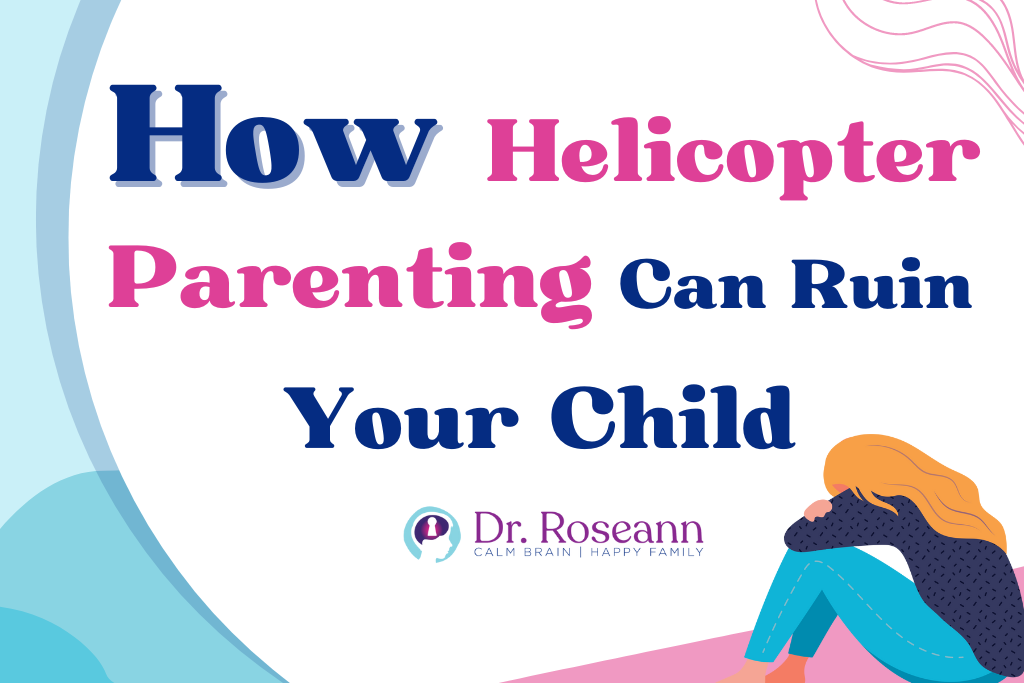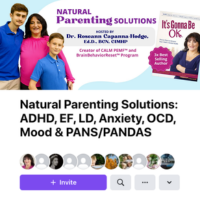A child is every parent's bundle of joy, and they have the instincts to protect them. Children are seen as fragile and innocent, and it is natural for parents to want them to be healthy, happy, and successful. And sometimes, we can fall into the overparenting trap.
Hey, we have all been there! With how the world is going today, we tend to be overprotective and overbearing, we can’t help it sometimes! But let me tell you from my 30 years of experience that helicopter parenting isn’t the answer. If you only knew of the helicopter parenting effects on children, you wouldn’t want to use it on your kid!
Parents need to see children as human beings with the potential to change the world. They should allow their kids to make their own decisions and learn from their mistakes. This is how they can be independent and learn accountability.
Do you find yourself meddling with your children’s affairs? Do you sign them up for various workshops without their consent? Do you choose their friends for them? Even worse, do you do their homework and projects? Oh-uh, these are telltale signs of helicopter parenting.
What is Helicopter Parenting?
Experts define helicopter parenting as excessively hovering over and micromanaging their child's life, often interfering with their decision-making and independence. Helicopter parents are overprotective parents who hover over their children's every move, never allowing them to experience problems or setbacks.
Over involved parents can be overbearing. They constantly monitor their activities, intervening at the first sign of trouble. They are most likely to hover in school and watch their children's social interactions.
What are the Symptoms of Helicopter Parenting?
Symptoms of helicopter parenting often manifest through specific behaviors and tendencies. The helicopter parents psychology is often rooted in well-intentioned concerns for their child's well-being, success, and safety. Its common signs include:
- Excessive Monitoring: Helicopter parents tend to closely monitor every aspect of their child's life, from academic performance to social interactions, often invading their privacy.
- Overinvolvement: They frequently intervene in their child's activities, such as school projects or friendships, attempting to control or direct the outcomes.
- Fear of Failure: Helicopter parents often exhibit an intense fear of their child experiencing failure, leading them to intervene to prevent any potential setbacks.
- High Expectations: Setting unrealistically high expectations for their child's success, helicopter parents may place immense pressure on them to excel in academics, extracurriculars, and other pursuits.
- Difficulty Allowing Independence: Helicopter parents struggle to let their children make decisions independently or face challenges on their own, fearing negative consequences.
- Constant Communication: They maintain an unusually high level of communication, frequently checking in on their child's activities and experiences, even into adulthood.
- Micromanagement: Helicopter parents may engage in micromanaging tasks, from organizing their child's schedule to dictating how they should approach various aspects of their lives.
- Inability to Accept Mistakes: Helicopter parents find it challenging to accept their child's mistakes or failures, often intervening to rectify the situation rather than allowing the child to learn from it.
- Limited Risk-Taking Opportunities: They may restrict their child from taking risks or facing challenges, aiming to shield them from potential harm or failure.
- Difficulty with Transitions: Helicopter parents may struggle to adjust to their child's increasing independence, finding it hard to let go as the child grows older.
Recognizing these symptoms is crucial for both parents and children, as it allows for open communication, setting healthy boundaries, and fostering an environment that supports the child's autonomy and growth.
What are the Signs of a Helicopter Parent?
Are you a helicopter parent? Are you Bubble Wrap Parenting™ your kid? Let’s get into the nitty gritty and understand the characteristics of helicopter parents. The helicopter parenting examples below can help.
While being a responsible parent is a good thing, but also be conscious of the detrimental effects of helicopter parents if you step over your boundaries and fail to foster independence in your child. Here are examples of helicopter parenting:
- You prevent your child from exploring their abilities by not letting them take age-appropriate risks. You run over and tell them to stop when you see them climb a tree or are too quick to swoop in when they get a bad grade.
- You have a hard time allowing your child to learn from their own mistakes. You closely watch over them and correct them before they make mistakes. For example, a kid is super excited to get their hands on a new set of crayons and a coloring book, but she gets scolded when she colors outside the lines. Allow them to be creative and see their imagination flow.
- You are your child's shadow. You pay close attention to them while playing, following and directing them, and not allowing alone time. This will not teach your kids independence at all. They will be codependent at all times and this will not serve them as they grow.
- Throughout their schooling, you have the urge to recommend your child's teacher and select their friends and activities. Kids need to make their own choices, so they can develop a sense of self. Self-identity is a crucial value that a child should gradually build, especially during their younger years.
- You study your child's lessons and do their homework and projects. Allow your child to do their schoolwork on their own. Assignments are there to reinforce what they are taught in class and it will not do them any favor if you do it for them. Homework is also how executive functioning skills are developed.
- Like Superman, you shield your child from failure. When they fail or have poor grades, you pull your weight to change that. This includes arguing with teachers. Failure is quite a motivator for kids and how they learn to navigate their world independently.
- You do things that your child can do for themself. You either lack patience or you want things done a certain way, so you do too much for your child.
- You are shaping your child to fulfill your unfulfilled dreams. You push your child in areas that you wish you had opportunities even though your kid may not have the same interests. Allow your kids to be their person.
- You negotiate your child's conflicts, not allowing them to develop problem-solving skills. When you constantly offer your child a swim vest in two feet of water, they won’t even learn to swim. Conflict may be uncomfortable but they are an important part of self development.
- Instead of trusting other adult figures and letting your child learn from them, you train your child's trainers and tell them how to do things differently for your child. Whenever you “preview” things for those who work with your child (tutors, caregivers, babysitters, etc.), you don’t give them a chance to form their relationship. That doesn't mean you don't share anything but give the Cliff Notes version, not the Encyclopedia Britannica.
- You hold the responsibility for all your child's house chores. Kids who do chores have greater self-confidence and are more successful in life. Start small with developmentally appropriate chores and build from there.
- You don't allow them to make age-appropriate choices. When we limit decision-making, we stunt the development of those skills. We want our kids to be good decision-makers and allow them opportunities to make choices whenever they can.
Helicopter Parenting Pros and Cons
Many studies have found the pros and cons of helicopter parenting. But let’s get one thing straight, you may think that over-parenting or Bubble Wrap Parenting™ means that you are going above and beyond and that will make you a better parent – but it’s not. It’s the opposite.
You want your child to be a leader, not a follower. That means they need to be able to think on their feet, be flexible thinkers, and tolerate stress. That isn’t going to happen if they are peeking around the corner looking for you to make decisions for them.
So what are the pros of helicopter parenting? To a certain extent, educators agree that parental involvement in school can be beneficial. Discussing the child's behaviors at home and in school may lead to a better understanding of the child and discovering the best ways for the child's intellectual and emotional development and academic success. Good school-home communication can help kids who struggle with attention, learning, and behavioral regulation.
Research has found that a parent's involvement in school fosters positive attitudes and diligent homework habits, reduces absenteeism, and enhances academic performance. It sends a message to kids that education is important and that they need to develop independent learning skills.
Among college students, one study found parental involvement to positively affect areas such as lowering substance and alcohol usage and fostering decision-making skills, life skills, physical health, mental health issues, and career development.
Positive support from parents in financial and emotional areas has also proven valuable. For example, adult children of involved but balanced parents who provide support have better psychological adjustment and life satisfaction than those who do not.
Negative Effects of Helicopter Parenting
While helicopter parents have good intentions and positive aspects, such as a genuine desire to raise successful children and the willingness to go above and beyond, there are also cons to being a helicopter parent. Here are some of them.
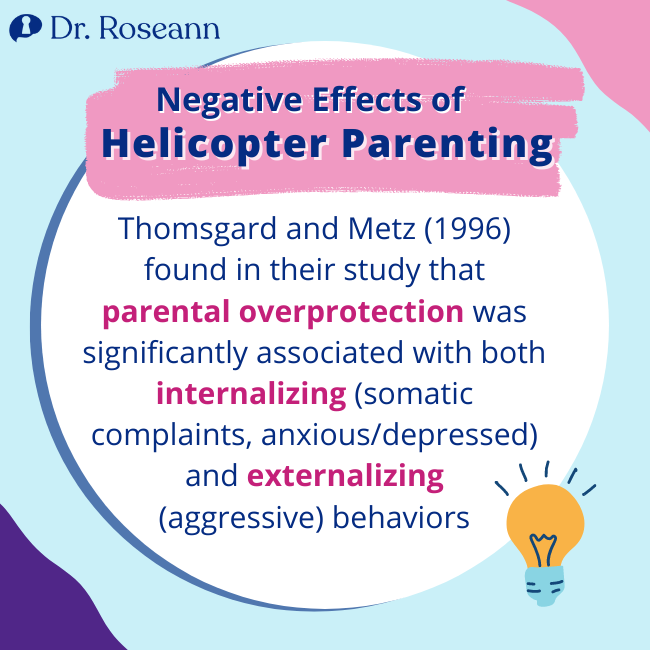
Thomsgard and Metz (1996) found in their study that parental overinvolvement was significantly associated with both internalizing (somatic complaints, anxious/depressed) and externalizing (aggressive) behaviors. We have long known that over-parented children are also more likely to have social anxiety (Parker, 1982), yet kids seem to be less autonomous than ever.
1. Hinders a Child's Early Development
As first-time parents, we naturally want to do everything we can to protect our toddler from harm. But could the helicopter parent style create problems for our kids down the road?
Parenting facts and statistics in 2018 followed 422 children over eight years — at ages 2, 5, and 10 and saw the negative impact of helicopter parenting.
At the end of it, researchers found that children of helicopter parents are more likely to have emotional and behavioral problems later in life. Many Failure to Launch young adults were overparented and have stunted emotional development as a result.
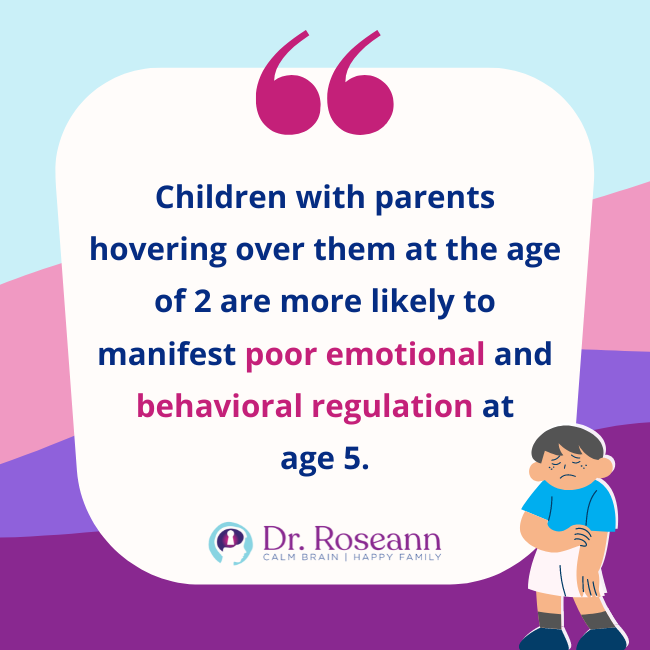
A child with a hovering mother at the age of 2 is more likely to manifest poor emotional and behavioral regulation at age 5. The problem with overparenting is kids come to rely on their helicopter dad to save them when they feel uncomfortable.
On the flip side, kids who were parented to be more autonomous are more able to tolerate stress. These children with better emotional regulation at age 5 tend to do better in school and social situations when they reach age 10. They are less moody and more successful in school and in life too.
2. Prevent Children from Learning from their Mistakes
In their infanthood, we watch our child fall asleep and fall in love with their innocence and how much they need us. All we want is to keep them safe from the world, and it's natural for us to feel scared because we know from experience that the world can be cruel.
However, time flies so fast, and an infant becomes a toddler in the blink of an eye. Just as it is a parent's instinct to protect their child, it is also a toddler's nature to crawl, walk, climb, stretch, and discover what their body can do.
The first five years of a child's life are crucial for physical, intellectual, and social-emotional development. During this time, they learn essential skills that will help them grow into healthy, happy adults throughout their lives.
Parents must provide a safe and supportive environment where their children can grow and thrive. That also means we need to give them increased opportunities for independence. You have to sit back and watch them safely fail.
That doesn’t mean letting them burn their hand while cooking but it may mean they put too much pepper on their meat and watch them spit it out. Trust me they won’t do that again! So how do you know if you are one of those helicopter mothers?
Helicopter parents may:
- try to prevent every minor fall
- never let the child play alone
- constantly request the preschool teacher for progress reports
- not foster developmentally appropriate independence
Taking age-appropriate risks is part of a child's development. They need to make mistakes and develop problem-solving skills through trial and error. Parents who always fix their kids' mistakes don't give them a chance to learn and grow.
Making mistakes is integral to development, and children can learn much from them. This is especially important as kids age and are faced with more complex problems. You want your teen to say ‘no’ to dangerous situations and make smart choices for themselves. They won’t be living with you forever, so let's give them the skills they need.
3. Children Fail to Develop Self-Advocacy Skills
Many helicopter moms pride themselves as super parents who feel the need to rescue their child at the slightest hint of a problem. However, kids must also learn to be their heroes and stand up for themselves in challenging situations.
I can say that my mom and dad gave me the gift of speaking up for myself. That meant I said, “No.” Sometimes to parents and certainly to kids that asked me to do dumb things. I never felt the need to be a people pleaser and that has served me well in so many ways personally, professionally, and even spiritually. I have learned to trust my gut and do only what I love. My parents made a lot of brave choices by fostering my independence but I think I turned out okay!
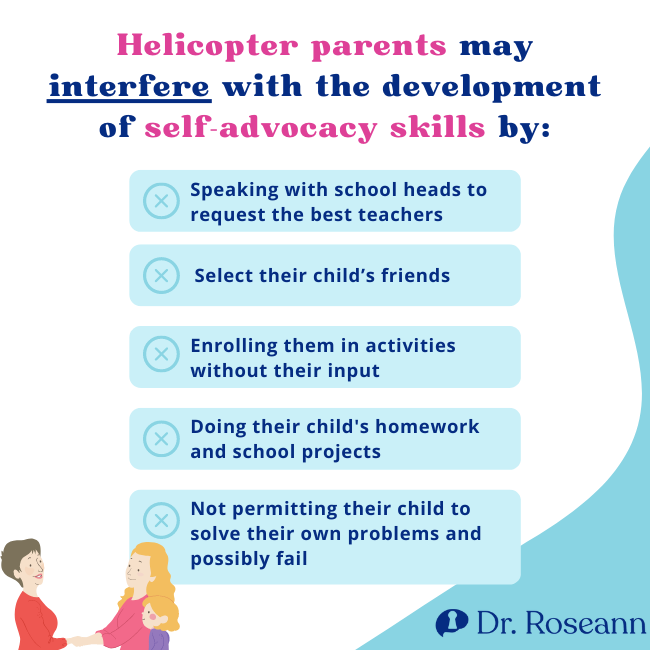
Helicopter parents may interfere with the development of self-advocacy skills by:
- Speaking with school heads to request the best teachers
- Select their child’s friends
- Enrolling them in activities without their input
- Doing their child's homework and school projects
- Not permitting their child to solve their problems and possibly fail
It's also common for helicopter parents to get involved in their children's conflicts. If your little boy is being bullied at school, your desire to come to their rescue is perfectly understandable. While it's important to intervene when necessary, it's also vital to utilize real-life situations as teaching opportunities for kids to deal with some things themselves.
Rather than being a helicopter parent, be a positive parent with a focus on coaching them through the challenge. Teach your child ways to handle friendship conflicts.
Appreciate your child's strengths and show them how to use their strengths to grow in harder areas. No one loves conflict but kids will always need conflict management skills throughout their life. Rescuing doesn’t serve them and is only a bandage.
Sometimes, the best way to help your child as a parent is to step back and let your child handle the situation. This will teach them valuable life skills they will use for the rest of their lives. It may be harder for you than your kid but the more you let them manage conflict on their own, the less you will have to support them as teens and adults because they will be so good at it.
4. Encourage a Child's Sense of Entitlement
Adult children of overly involved parents may exhibit higher levels of narcissism and a sense of entitlement.
When your child is made to feel like the most important person in the world, they may find it challenging to make friends in school and develop relationships at the workplace. It may even affect their prospects for a romantic relationship as young adults.
Early in a child's life, they must be taught to be considerate of others. Other people have needs and your child should also learn to care for others and become a contributor in group projects.
When your child is used to receiving love, attention, food, and household care from you, they may never learn the nature of give and take, which is vital in fostering relationships later in life.
Simple things such as learning to cook, helping clean the house, and appreciating the little things people do for them can make your child a much better person. This can help your child cultivate life-giving relationships, directly impacting their happiness and quality of life later on.
5. Helicopter parents who criticize their kids may cause them to have low self-esteem
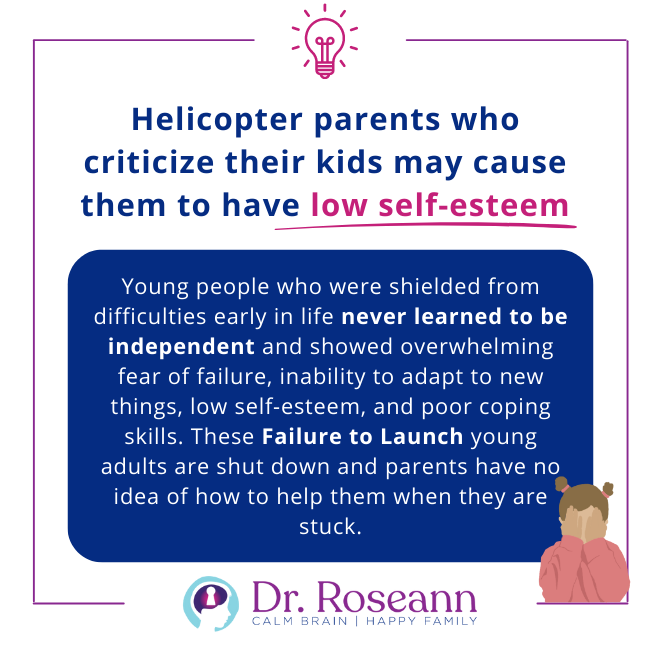
A constant flood of advice may cause your child to doubt themselves and feel insecure. Without anchoring themselves, emotional issues are sure to develop. We know through research that kids who are overparented are more likely to experience social anxiety, mood issues, and generalized anxiety.
When all you do is point out your child's mistakes, you may not appreciate your child's efforts to grow and improve, and they may feel like a failure.
Too much academic pressure from parents gets in the way of developing a genuine love for learning and may lead to poor academic performance.
Children of parents who hover over their education and school life too much display worse psychological health and are more prone to anxiety, depression, and substance abuse. They are likely to give up and display “low motivation.” Many Failure to Launch young adults have a history of overbearing parents that fostered poor self-concept.
Young people who were shielded from difficulties early in life never learned to be independent and showed overwhelming fear of failure, inability to adapt to new things, low self-esteem, and poor coping skills. These Failure to Launch young adults are shut down and parents have no idea of how to help them when they are stuck.
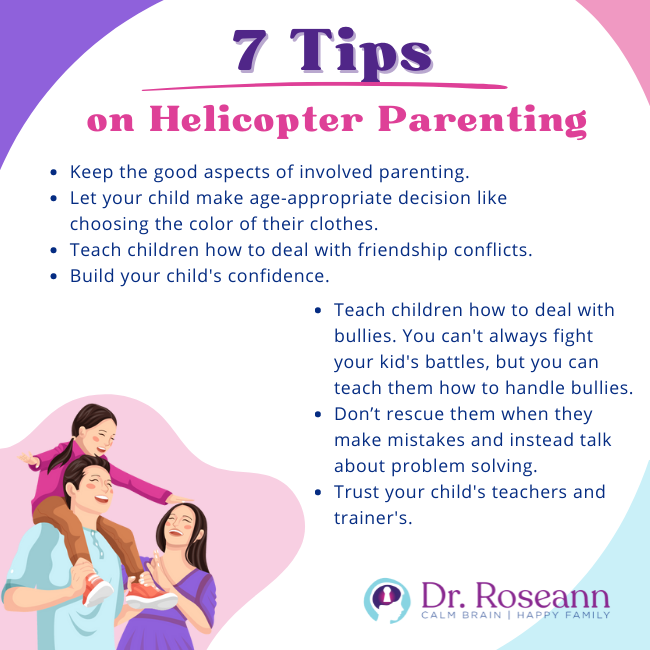
Finals Tips for Helicopter Parents
Parenting today is harder than ever. There are academic, social, and technological pressures that get in the way of parent-child relationships. Focusing on mental health is critical in today’s world, so your child can be a successful and happy adult.
It may have many names overparenting, Helicopter Parenting, or Bubble Wrap Parenting™, but not letting your child be autonomous harms their development.
Key Takeaways on Helicopter Parenting
- Keep the good aspects of involved parenting.
- Working with your child’s teacher to help children study, and develop life skills and social skills is always beneficial but don’t dictate to them.
- Teach children how to deal with friendship conflicts. You can’t always fight your kid’s battles, but you can teach them how to handle social conflicts.
- Explicitly coach them on how to manage bullies because that should never be ignored:
- Tell a teacher
- Get peer counseling when available
- Promote body-positive language.
- Teach your child the value of inclusivity and that children of all colors and body shapes can be good people who contribute to society.
- Build your child's confidence. If your child feels good about themselves, issues are likely to affect their self-esteem.
- Appreciate your child’s positive qualities and encourage them to nurture their talents.
- Let your child make age-appropriate decisions whenever possible.
- Don’t rescue them when they make mistakes and instead talk about problem-solving.
- Spend time with your child outdoors and let them play and run in safe spaces. It’s okay if they get dirt on their clothes.
- Eventually, you must let your child fight their own battles. But you can be there for them when they ask for your help or advice, or when they need to open up.
- Tell stories to your kids and read books. Fantasy adventure stories and books that focus on problems and solutions highlight the value of friendship, love, goodness, hard work, and of course, slaying your dragons too!
- Have your dreams or hobbies but let your kids find their own. Your children are not the extension of your dreams. Pursue your passions in your own time and don’t force them on your child.
- Trust your child’s teachers and coaches. It’s good for your child to be exposed to other authority figures and learning styles, so they can become flexible individuals later on in their professional lives.
As parents, we should teach our kids how to be independent and do things on their own. It’s OK that they are uncomfortable sometimes. When kids learn how to manage conflicts, they become more resilient. That is how they develop grit and the life skills they need to thrive as an independent adult in the bigger world.
When kids don’t know how to tolerate everyday stressors, they will struggle with resilience. Stress is a part of our everyday lives and we want them to be stress slayers.
The biggest parenting takeaway is to let your child be independent and self-reliant and allow them to make mistakes so they can build self-confidence and accountability. These are values that should be built during their younger years so they can cope with what life has to give them as they grow and experience the real world.
What is helicopter parenting style?
Helicopter parenting is a style of parenting characterized by excessive involvement and overprotection. Parents who adopt this style tend to closely monitor and control various aspects of their child's life, including academics, extracurricular activities, and social interactions.
What's a helicopter mom like?
A helicopter mum is overly involved in her child's life, particularly in areas where the child is expected to develop independence. Helicopter moms tend to hover over their children, closely monitoring and often intervening in various aspects of their lives, such as academics, extracurricular activities, and social interactions.
What is hovering in a relationship?
Hovering refers to a behavior where one person is excessively monitoring or being overly involved in the affairs of another, often to the point of intrusiveness. This can manifest as constant checking in, micromanaging, or closely monitoring the activities and decisions of the other person. Hovering parents can promote a lack of trust, boundary issues, or an overprotective stance, and it may contribute to feelings of discomfort or a sense of being stifled in the relationship.
Are helicopter parents toxic?
Helicopter parenting, characterized by excessive control and overinvolvement, can have negative impacts on a child's development, potentially leading to limited independence, increased anxiety, and low self-esteem. The constant monitoring and lack of autonomy may hinder the child's ability to develop essential life skills and navigate challenges independently.
How does helicopter parenting affect a child?
Helicopter parenting negatively affects a child by limiting their independence, hindering the development of resilience and coping skills, and contributing to increased anxiety due to high parental expectations. Children raised under helicopter parenting may also experience lower self-esteem, difficulty with decision-making, and challenges in forming and maintaining social relationships.
How helicopter parenting behaviors impact the child's growth?
This parenting style may foster a reliance on external validation, diminishing self-esteem, and deterring the natural progression of problem-solving abilities. The fear of failure heightened anxiety, and a dependence on authority figures emerge as further consequences, collectively shaping a child's emotional, social, and cognitive development.
What are the signs of helicopter parenting in adulthood?
Signs of helicopter parenting in adulthood may include difficulty making decisions, a strong dependency on parents for support, and lingering issues with self-esteem and confidence. Adults with a history of helicopter parenting might exhibit a fear of failure, struggle in interpersonal relationships, and face challenges in the professional realm due to a lack of independence and autonomy.
What’s the difference between helicopter parents vs lawnmower parents?
Helicopter parents closely monitor and intervene in their children's lives to shield them from potential difficulties, often leading to a lack of independence. Lawnmower parents take a more proactive approach by actively removing obstacles or challenges from their children's paths, aiming to ensure their success. Both parenting styles, though well-intentioned, may hinder the development of resilience and independence in children.
What is hands off parenting?
Hands-off parenting, also known as free-range parenting or uninvolved parenting, is an approach characterized by a more relaxed and less interventionist stance. The hands off parents are the opposite of helicopter parenting.
Is helicopter parenting abuse?
Helicopter parenting is generally not considered abuse, as it typically involves overprotective behavior stemming from a genuine desire to support and protect a child. While it may hinder a child's development of independence, abuse involves intentional harm, neglect, or mistreatment causing significant emotional, physical, or psychological damage. Extreme cases of helicopter parenting that result in harm or distress to the child may be seen as a form of emotional or psychological abuse.
How do helicopter parents show up in the workplace?
In the workplace, helicopter parents may display overinvolvement by attempting to micromanage their adult children's professional lives, exhibiting constant communication, and struggling to delegate tasks or trust colleagues. Their involvement may extend to conflict resolution, and a heightened emphasis on success can lead to unrealistic expectations and added pressure.
Do the helicopter parenting tendencies persist?
Yes, helicopter parenting tendencies can persist into adulthood and impact various aspects of an individual's life, including their relationships, career, and overall well-being.
How to recover from overprotective parents?
Recovering from overprotective parenting involves cultivating self-awareness, setting boundaries with parents, and seeking professional support to address emotional impacts. Gradually building independence, developing decision-making skills, and cultivating a supportive network contribute to the recovery process. Engaging in self-compassion, effective communication with parents, and educating oneself on personal development further aid in overcoming the overprotective parents consequences.
How to deal with helicopter parents?
Dealing with helicopter parents involves assertively setting boundaries, fostering open communication about personal needs, and gradually demonstrating responsible decision-making to build trust. Expressing appreciation for their concern while emphasizing the importance of autonomy can help strike a balance between maintaining a healthy relationship and gaining independence.
Citations:
Arrindell, W. A., Kwee, M. G., Methorst, G. J., Van der Ende, J., Pol, E., & Moritz, B. J. (1989). Perceived parental rearing styles of agoraphobic and socially phobic in-patients. The British Journal of Psychiatry, 155, 526–535. https://doi.org/10.1192/bjp.155.4.526
APA (2018). Helicopter Parenting May Negatively Affect Children’s Emotional Well-Being, Behavior. https://www.apa.org/news/press/releases/2018/06/helicopter-parenting
Parker G. (1982). Parental representations and affective symptoms: examination for a hereditary link. The British journal of medical psychology, 55(Pt 1), 57–61. https://doi.org/10.1111/j.2044-8341.1982.tb01482.x
Thomasgard, M., & Metz, W. P. (1996). The 2-year stability of parental perceptions of child vulnerability and parental overprotection. Journal of developmental and behavioral pediatrics: JDBP, 17(4), 222–228.
Dr. Roseann is a mental health expert in Neurodivergence who frequently is in the media:
- Helping Children Thrive Podcast Benefits of Neurofeedback for children with ADHD
- Very Well Mind What Is Asperger Syndrome?
- Parents Are Your Kid's Meltdowns a Sign of Rejection Sensitive Dysphoria?
Always remember… “Calm Brain, Happy Family™”
Disclaimer: This article is not intended to give health advice and it is recommended to consult with a physician before beginning any new wellness regime. *The effectiveness of diagnosis and treatment vary by patient and condition. Dr. Roseann Capanna-Hodge, LLC does not guarantee certain results.
Are you looking for SOLUTIONS for your struggling child or teen?
Dr. Roseann and her team are all about science-backed solutions, so you are in the right place!
Grab your complimentary copy of
147 Therapist-Endorsed Self-Regulation Strategies for Children: A Practical Guide for Parents
You can get her books for parents and professionals, including: It’s Gonna Be OK™: Proven Ways to Improve Your Child’s Mental Health, Teletherapy Toolkit™ and Brain Under Attack: A Resource For Parents and Caregivers of Children With PANS, PANDAS, and Autoimmune Encephalopathy.
If you are a business or organization that needs proactive guidance to support employee mental health or an organization looking for a brand representative, check out Dr. Roseann’s media page and professional speaking page to see how we can work together.
Dr. Roseann is a Children’s Mental Health Expert and Licensed Therapist who has been featured in/on hundreds of media outlets including The Mel Robbins Show, CBS, NBC, PIX11 NYC, Today, FORBES, CNN, The New York Times, The Washington Post, Business Insider, Women’s Day, Healthline, CNET, Parade Magazine and PARENTS. FORBES called her, “A thought leader in children’s mental health.”

She coined the terms, “Re-entry panic syndrome” and “eco-anxiety” and is a frequent contributor to media on mental health.
Dr. Roseann Capanna-Hodge has three decades of experience in working with children, teens and their families with attention-deficit hyperactivity disorder (ADHD), autism, concussion, dyslexia and learning disability, anxiety, Obsessive Compulsive Disorder (OCD), depression and mood disorder, Lyme Disease, and PANS/PANDAS using science-backed natural mental health solutions such as supplements, magnesium, nutrition, QEEG Brain maps, neurofeedback, PEMF, psychotherapy and other non-medication approaches.
She is the author of three bestselling books, It’s Gonna Be OK!: Proven Ways to Improve Your Child's Mental Health, The Teletherapy Toolkit, and Brain Under Attack. Dr. Roseann is known for offering a message of hope through science-endorsed methods that promote a calm brain.
Her trademarked BrainBehaviorResetⓇ Program and It’s Gonna be OK!Ⓡ Podcast has been a cornerstone for thousands of parents facing mental health, behavioral or neurodevelopmental challenges.
She is the founder and director of The Global Institute of Children’s Mental Health, Neurotastic™Brain Formulas and Dr. Roseann Capanna-Hodge, LLC. Dr. Roseann is a Board Certified Neurofeedback (BCN) Practitioner, a Board Member of the Northeast Region Biofeedback Society (NRBS), Certified Integrative Mental Health Professional (CIMHP) and an Amen Clinic Certified Brain Health Coach. She is also a member of The International Lyme Disease and Associated Disease Society (ILADS), The American Psychological Association (APA), Anxiety and Depression Association of America (ADAA) National Association of School Psychologists (NASP), International OCD Foundation (IOCDF).
© Roseann-Capanna-Hodge, LLC 2024
Disclaimer: This article is not intended to give health advice and it is recommended to consult with a physician before beginning any new wellness regime. *The effectiveness of diagnosis and treatment vary by patient and condition. Dr. Roseann Capanna-Hodge, LLC does not guarantee certain results.

